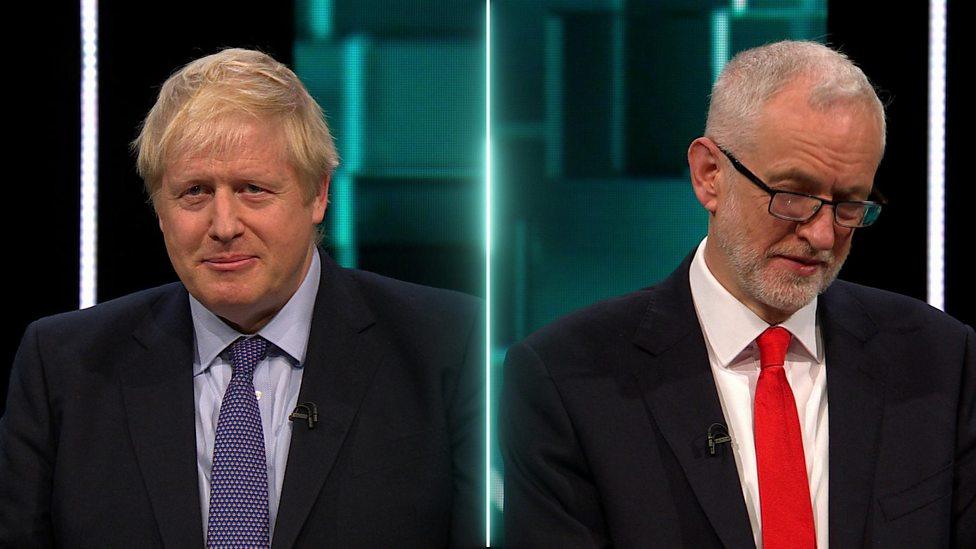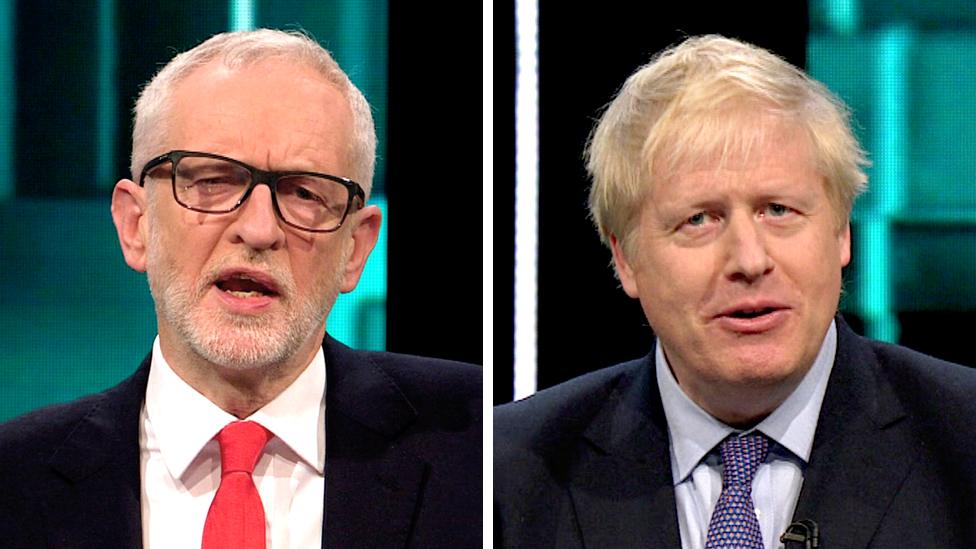Election debate: How did it play out online?
- Published

Jeremy Corbyn and Boris Johnson faced off on ITV in the first head-to-head debate of the election campaign
Head to head. Mano a mano. Without Jo Swinson or the other party leaders, this was Boris Johnson v Jeremy Corbyn.
And the battle online was just as raucous as the debate on screen.
While much of UK political Twitter was busy sliding uninvited into Arron Banks' DMs, Labour's 280-character cheerleaders were propelling #WinForCorbyn towards the upper echelons of the list of top UK trends.
Nothing says "for the many, not the few" quite like furiously retweeting a hashtag which implicitly asks you to consider not so much what the country can do for you, but what it might do for Jezza (and, incidentally, the Labour leader's nickname also went briefly viral).
Allow X content?
This article contains content provided by X. We ask for your permission before anything is loaded, as they may be using cookies and other technologies. You may want to read X’s cookie policy, external and privacy policy, external before accepting. To view this content choose ‘accept and continue’.

Not that the #BackBoris brigade were any less single-minded in supporting their glorious leader. The Prime Minister's party had organised some pictures in a boxing ring and prominent Conservatives were extremely eager to share them with supporters.
Allow X content?
This article contains content provided by X. We ask for your permission before anything is loaded, as they may be using cookies and other technologies. You may want to read X’s cookie policy, external and privacy policy, external before accepting. To view this content choose ‘accept and continue’.

Overall, #WinForCorbyn was used more than twice as often as #BackBoris on Twitter during the debate, but that is perhaps to be expected.
Evidence suggests that people who talk politics on Twitter are more likely to support Labour, external than the population at large, while Facebook users are thought to be more evenly distributed, external along the political spectrum.
'factcheckUK'
By the time host Julie Etchingham was introducing the opening statements, Conservative Campaign Headquarters had rebranded its Twitter account "factcheckUK". It was a move criticized by an actual fact-checking organisation:
Allow X content?
This article contains content provided by X. We ask for your permission before anything is loaded, as they may be using cookies and other technologies. You may want to read X’s cookie policy, external and privacy policy, external before accepting. To view this content choose ‘accept and continue’.

Later, Boris Johnson was asked if the truth mattered in this election.
"I think it does," he responded, to laughter from the audience.
It wasn't the only time pointed laughter was heard from the studio audience, with Mr Corbyn's failure to spell out his position on Brexit also eliciting snorts.
Facebook wars
On the Facebook front, a second-screen battle was being waged, with official party pages quickly firing out posts to respond to key points in the debate.
"THE MOMENT OF THE DEBATE SO FAR," one Conservative post declared over a video of Johnson responding to questions on the NHS:

Minutes later the Labour Party shared a video of its own, declaring: "You can't trust the Tories with the NHS."

And then, via an odd forced handshake and further sparring, the debate drew to a close - and the rush for supporters to declare their man the winner began.
"Boris Johnson... was the undisputed winner of that debate," trumpeted Robert Jenrick, external. The official Conservative Party account had even got a handy winners graphic ready and published before the debate was due to finish.
Allow X content?
This article contains content provided by X. We ask for your permission before anything is loaded, as they may be using cookies and other technologies. You may want to read X’s cookie policy, external and privacy policy, external before accepting. To view this content choose ‘accept and continue’.

Labour figures were, naturally, equally clear in their own convictions.
Allow X content?
This article contains content provided by X. We ask for your permission before anything is loaded, as they may be using cookies and other technologies. You may want to read X’s cookie policy, external and privacy policy, external before accepting. To view this content choose ‘accept and continue’.

For what it's worth, YouGov's snap poll made it all rather more of a close-run thing - and BBC News political editor Laura Kuenssberg agreed.
Allow X content?
This article contains content provided by X. We ask for your permission before anything is loaded, as they may be using cookies and other technologies. You may want to read X’s cookie policy, external and privacy policy, external before accepting. To view this content choose ‘accept and continue’.

Allow X content?
This article contains content provided by X. We ask for your permission before anything is loaded, as they may be using cookies and other technologies. You may want to read X’s cookie policy, external and privacy policy, external before accepting. To view this content choose ‘accept and continue’.

You can follow BBC Trending on Twitter @BBCtrending, external, and find us on Facebook, external. All our stories are at bbc.com/trending.
- Published19 November 2019
- Published20 November 2019
